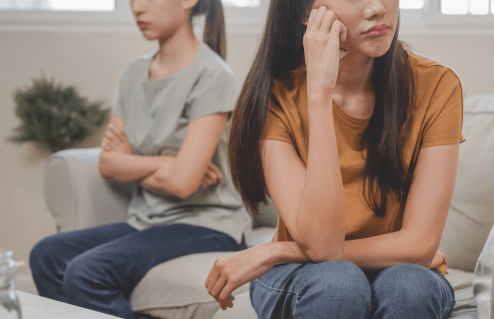How to be kind to yourself
Preeti Sumal interviews Kristin Neff, author of Self-Compassion: Stop Beating Yourself Up And Leave Insecurity Behind, asking how we can learn to give ourselves a break

At the beginning of this year, I started exploring about how to become connected – to other people and to life. One of my greatest challenges is my negative self-talk and giving myself a hard time when things don’t turn out the way that I hoped.
Whether it’s running late for a meeting or feeling like I’ve said something that might have annoyed someone, the disapproving voice inside my head will immediately turn up the volume with harsh words and leave me feeling inadequate and frustrated. I needed to address this somehow and learn to be nicer to myself. Here Dr Neff shares her wisdom.
Psychologies: What is self-compassion?
KN: I usually give two levels of response to that. The easiest way to understand it is simply treating yourself like a good friend – with the same kindness and care and support. But, in more detail, it’s composed of three components. The first is kindness; treating yourself like a good friend as opposed to being harshly judgemental. But, in order to keep self-kindness from being a form of self-pity, two other components are necessary.
One is common humanity – remembering that imperfection, in terms of yourself, your mistakes and struggles, is part of the shared human experience. So, compassion isn’t a ‘poor me’ feeling, it’s just recognising that life is difficult for everyone.
The third component is mindfulness, which is also key to keeping self-compassion from devolving into brooding and feeling sorry for oneself. It refers to the ability to step outside yourself and see what’s happening, see that things are difficult or that you’ve made a mistake or you’re struggling, and hold that suffering in mindful awareness as opposed to getting lost in it or fused to it, which is our more habitual response. You need all three components to be present in order for it to be true self-compassion.
Psychologies: How did you become interested in self-compassion?
KN: I learned about it from a meditation teacher in my last year of doing my PhD at the University of California, Berkeley. I was under a lot of stress, so I went to a meditation course to deal with it. Surprisingly, the teacher talked a lot about the importance of being compassionate to yourself, just like we’re compassionate to others. It’s really something I hadn’t considered before and, when I started trying to be more kind and compassionate to myself, it made a huge, immediate difference. So it developed from my own personal experience and the research is a way of investigating and providing empirical support for my own experience, which is that it really works.
Psychologies: What is the biggest difference it’s made in your life?
KN: It’s changed everything. Self-compassion is amazing. It can hold any negative emotion. So, if you think of the whole panoply of negative emotions – there’s shame, there’s feeling inadequate, there’s making mistakes, there’s screwing up, there’s failure – and these are just the personal ones.
When my son was diagnosed with autism, I saw the amazing power it had to help me. It can help with just about any challenge life throws your way – health issues; divorce. Self-compassion gives you the ability to hold life’s challenges in a sense of support and care and tenderness and connectedness, and I think that’s really why it can make such an amazing difference in people’s lives. It’s a resource that most people don’t even begin to tap into.
Psychologies: How would I recognise that I’m being compassionate to myself?
KN: You can tell by the presence of ‘being kind’; and remembering that this is part of the human experience – to be imperfect; and by being mindful. You can also recognise it by the absence of these. So, people who are highly self-critical, who tend to feel like ‘it’s just me, everyone else is living this perfect life and it’s just me who’s failed or who is struggling’; or people who get really fused to, or what I call over-identified with, their negative emotions and get lost in the storylines – they are lacking in self-compassion. That’s a way to measure where people are, by the presence of the positive components and the absence of the negative ones.
Psychologies: I find it hard to be kind to myself. I’ll say the right things but I might not always believe what I’m saying… How important is it to really believe, and feel, it; and how can I do that?
KN: Self-compassion is a practice of cultivating your intention. So, you set your intention to be kinder and more supportive to yourself but you can’t force it, and it often does feel fake at first. People aren’t used to acting that way. It may sound awkward at first, it may even feel uncomfortable at first, it may even be scary at first, because people often cling to the self-criticism like a protective mechanism.
Therefore, it’s like planting seeds. The more you choose to at least give it a go, at least try it, eventually, with practice, it starts feeling authentic and you’ll find ways of speaking to yourself that feel authentic. At first, you may try something out and it just seems strange but most people, with time and practice, do start being able to feel compassion for themselves.
But, we are reversing the habit of a lifetime. It’s not like you can just snap your fingers and a lifetime of habits go away. But I’ve been amazed at how quickly people can change. Over the course of our eight-week Mindful Self-Compassion programme, most people say that their lives have been transformed, and that’s just eight weeks. Then, when they continue to practice, it continues to transform them.
Psychologies: I find it difficult to practise self-compassion at the times when I really need it the most; in the moment. How can I best help myself at those times?
KN: There are different ways we can access a compassion response and we know this from research – in terms of what helps us receive compassion or give compassion to others: physical warmth; a gentle touch; soothing vocalisations; a warm tone of voice. We know that these are triggers of the compassion system, so to speak.
So, sometimes, if your mind can’t go there because it’s flooded with the storylines of ‘I’m crap’, ‘I’m a failure’ or ‘I hate myself’, a gesture such as putting your hands on your heart or cradling your face or your stomach – some warm, supportive, physical gesture – can often change your body’s physiological response; help you calm down so you aren’t so activated, and then it’s sometimes easier for your mind to follow. It doesn’t always work, it’s not magic but it often helps. A lot of people report that they are surprised at how effective touch is.
Psychologies: How can we ensure that self-compassion doesn’t turn into selfishness?
KN: If you want the research point of view, it says just the opposite. Self-compassionate people are more likely to compromise. They don’t subordinate their own needs to those of others but they don’t prioritise them either. The idea is that everyone’s needs, including themselves, are worthy of consideration. They make better partners. People report being happier with self-compassionate partners because, when you give yourself the emotional resources, the emotional support; when you meet your own needs at least to the extent you are able to, you actually have more to give to others.
And, not only that, if you think about it, what’s a more self-absorbed state? Being lost in ‘I’m so bad’, ‘I’m so terrible’, ‘I’m worthless’, and feeling ashamed. Shame is an incredibly self-absorbed state. You can’t really give to others or be present for others when you’re filled with shame.
But, when you’re kind and understanding to yourself, you recognise that it’s human to mess up. Yes, you can regret your mistakes – actually self-compassionate people tend to feel guilt more than others – but they’re not consumed by shame and that allows them to have the mental space to focus on meeting the needs of others, as well as themselves. It also helps people from burning out; giving to others because, again, they’re recharging their own batteries constantly so it’s a myth that self-compassion is selfish. You want to be in contact with self-compassionate people, not self-critical people.
Psychologies: Do you ever struggle with self-compassion yourself; and what are your top tips for someone who is struggling to be self-compassionate?
KN: I have to be honest, at this point in my life, I’ve been practising it for almost 20 years, so not really. My first instinct is self-compassion when things are difficult. Sometimes it still takes me a little while. I get lost in the suffering – not so much self-criticism, I rarely go there – but I can still get lost in the pain of shame, or if I really was reactive, or if something really difficult happens. Sometimes, I can be lost in the pain but I almost never criticise myself for it.
It takes a little while but eventually I just remember: ‘What do I need to do right now? Oh yes, that’s right, self-compassion.’ So, I put my hand on my heart and I’ll speak supportively to myself in kind, caring words; I’ll be understanding. Even if it’s something that’s hard to deal with, like I said something that hurt someone’s feelings, and it’s so hard to go there. Your mind does not want to go there and I don’t think it could go there really, to look closely at what I’ve done, unless I had the strength of self-compassion.
Compassion can become a habit. But maybe one thing that I do that would be true for anyone is: the only way out is through. I know that if I avoid the pain or I don’t want it to be there, or I get angry at it, or I just get lost in reactivity, it’s just going to make things worse. I’ve learned through habit that, if I can learn to hold myself through the pain with a sense of kindness, care and concern, it allows things to transform more quickly. I trust that now. It’s hard to change these habits.
For people struggling to be compassionate to themselves, I would ask, do you have people in your life that you find it easy to be compassionate to, like a child or a good friend, and what would the effect be on that child or that good friend if you said to them what you are saying to yourself right now? Then it is pretty easy to see that, actually, maybe that won’t be so helpful. It’s good to use what you’re familiar with, and most people have familiarity with being a kind, compassionate, supportive person to someone else that they care about, so that can be your ‘role model’ of what to say and how to say it and help you realise the impact of your words on yourself.
Psychologies: My project is to find meaningful connection with both myself and others. How important is self-compassion in achieving that?
KN: I really don’t see how you could do it without self-compassion because meaningful connection takes two parties and, because you are a human being, you are going to make mistakes. You are going to say things that cause disconnection inadvertently, sometimes in an angry moment. This is the human condition.
We can’t always be in a state of perfect alignment in connection with others, no matter how hard we try. So, in order to re-establish connection, I think you first have to re-establish connection with yourself. Again, if you’re filled with shame, it makes you shut down, it makes you isolate yourself from others, it makes you not want to talk to anyone about what happened. You avoid it and it is hard to re-establish connection when you’re filled with shame.
I am actually a reactive person. That is why I am a self-compassion teacher, not a mindfulness teacher. It happens to me all the time: I say something and then think very quickly afterwards, after I have had my reaction, I cannot believe I did that. What was I thinking? But, in the moment, I wasn’t thinking. I wish I could say I never reacted, I’m not there yet – but I am very good at re-establishing connection because it is really important for me to own that I was out of line and then to apologise and do whatever it takes to try to repair any harm done. If I did not have compassion, I am sure I would have lost a lot of relationships and not been able to reclaim them.
Also, what is compassion? In some ways, compassion for self and others both stem from the same thing – understanding the human condition, understanding that none of us are in total control of our reactions, none of us are in total control of our behaviours. All of us are continually influenced by thousands of causes and conditions outside of our own control and that is just as true for ourselves as it is for others. So, if you treat yourself with a whole different set of rules than you treat others, you are kind of causing this false separation between self and others that I think leads to disconnection.
Psychologies: What are you working on next in this area?
KN: We’ve developed Mindful Self-Compassion – an eight-week programme of two and a half hours a week – and we are teaching that all over the world. We are training teachers, and we have written the manual, which is now pretty much up and running.
I want to help as many people as possible to be self-compassionate. I am especially interested in care givers – although everyone needs it – but people like teachers and medical professionals, people who often burn out because they are so focused on giving to others, they haven’t learned to give to themselves. I am experimenting to see if I can use a much briefer version of self-compassion training, so four 90-minute sessions that don’t require meditation.
Our Mindful Self-Compassion programme includes meditation and we know meditation is a great way to change brain habits but not everyone is into meditating, or they are not motivated to do it; they don’t have time to do it. I am really curious to see, with a briefer dose, using more informal practices, if we’re still able to get a big enough self-compassion boost that it helps prevent burnout and increase wellbeing.
We’ve done a brief pilot study with students and we had good effects so I am excited. I can see this being part of professional training for teachers, doctors, nurses, counsellors, a standard part of being trained in that profession. Plus a men’s university basketball team has asked me to train their players in self-compassion. I couldn’t refuse; it’s too interesting. I’m also writing a workbook with psychologist Chris Germer. It’s busy. It’s good and busy.
Photograph: iStock









